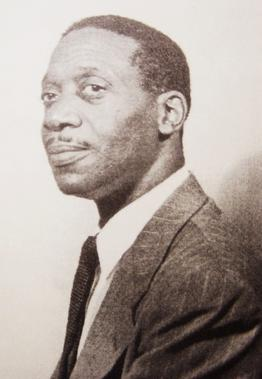More languages
More actions
(Created) Tag: Visual edit |
RedCustodian (talk | contribs) No edit summary Tag: Visual edit |
||
| Line 2: | Line 2: | ||
'''Harry Haywood''' (February 4, 1898 – January 4, 1985) was a Statesian communist who served on the Central Committee of the CPUSA from 1927 to 1938 and on the Politburo from 1931 to 1938. He defined the [[African diaspora in the United States]] as an oppressed [[nation]] with the right to [[self-determination]] and helped author [[Communist International (1919–1943)|Comintern]] resolutions on the African-American national question while living in the [[Union of Soviet Socialist Republics (1922–1991)|Soviet Union]]. He left the CPUSA in the late 1950s to join the [[New Communism|New Communist]] movement to become the leader of the [[Communist Party (Marxist–Leninist) (United States)|Communist Party (Marxist–Leninist)]], which followed [[Mao Zedong Thought]].<ref>{{Web citation|newspaper=[[Fight Back! News]]|title=On his 125th birthday, read Harry Haywood on Black power and the fight for socialism|date=2023-02-04|url=https://www.fightbacknews.org/2023/2/4/his-125th-birthday-read-harry-haywood-black-power-and-fight-socialism|retrieved=2023-02-05}}</ref> | '''Harry Haywood''' (February 4, 1898 – January 4, 1985) was a Statesian communist who served on the Central Committee of the CPUSA from 1927 to 1938 and on the Politburo from 1931 to 1938. He defined the [[African diaspora in the United States]] as an oppressed [[nation]] with the right to [[self-determination]] and helped author [[Communist International (1919–1943)|Comintern]] resolutions on the African-American national question while living in the [[Union of Soviet Socialist Republics (1922–1991)|Soviet Union]]. He left the CPUSA in the late 1950s to join the [[New Communism|New Communist]] movement to become the leader of the [[Communist Party (Marxist–Leninist) (United States)|Communist Party (Marxist–Leninist)]], which followed [[Mao Zedong Thought]].<ref>{{Web citation|newspaper=[[Fight Back! News]]|title=On his 125th birthday, read Harry Haywood on Black power and the fight for socialism|date=2023-02-04|url=https://www.fightbacknews.org/2023/2/4/his-125th-birthday-read-harry-haywood-black-power-and-fight-socialism|retrieved=2023-02-05}}</ref> | ||
== Life and work == | |||
=== Early Life === | |||
Harry Haywood was born in city of South Omaha within the state of Nebraska of the [[United States of America|United States]], on February 4, 1898. The youngest of three children, born to Harriet Hall nee Thorpe and Haywood Hall, his siblings were his brother Otto, born May 1891 and sister Eppa, born December 1896.<ref>{{Citation|author=Harry Haywood|year=January 1, 1978|title=Black Bolshevik|title-url=https://en.prolewiki.org/wiki/Library:Black_Bolshevik|chapter=Child of Slaves|chapter-url=https://en.prolewiki.org/wiki/Library:Black_Bolshevik#Chapter_1|section=https://en.prolewiki.org/wiki/Library:Black_Bolshevik#A_Child_of_Slaves}}</ref> | |||
== References == | == References == | ||
[[Category:Statesian communists]] | [[Category:Statesian communists]] | ||
[[Category:CPUSA members]] | [[Category:CPUSA members]] | ||
Revision as of 15:13, 6 July 2023
Harry Haywood | |
|---|---|
 | |
| Born | February 4, 1898 South Omaha, Nebraska, United States |
| Died | January 4, 1985 |
| Nationality | New Afrikan |
| Political orientation | Marxism–Leninism Anti-racism |
| Political party | CPUSA (1925–1959) CP(ML) (1959–1985) |
Harry Haywood (February 4, 1898 – January 4, 1985) was a Statesian communist who served on the Central Committee of the CPUSA from 1927 to 1938 and on the Politburo from 1931 to 1938. He defined the African diaspora in the United States as an oppressed nation with the right to self-determination and helped author Comintern resolutions on the African-American national question while living in the Soviet Union. He left the CPUSA in the late 1950s to join the New Communist movement to become the leader of the Communist Party (Marxist–Leninist), which followed Mao Zedong Thought.[1]
Life and work
Early Life
Harry Haywood was born in city of South Omaha within the state of Nebraska of the United States, on February 4, 1898. The youngest of three children, born to Harriet Hall nee Thorpe and Haywood Hall, his siblings were his brother Otto, born May 1891 and sister Eppa, born December 1896.[2]
References
- ↑ "On his 125th birthday, read Harry Haywood on Black power and the fight for socialism" (2023-02-04). Fight Back! News. Retrieved 2023-02-05.
- ↑ Harry Haywood (January 1, 1978). Black Bolshevik: 'Child of Slaves; https://en.prolewiki.org/wiki/Library:Black_Bolshevik#A_Child_of_Slaves'.
